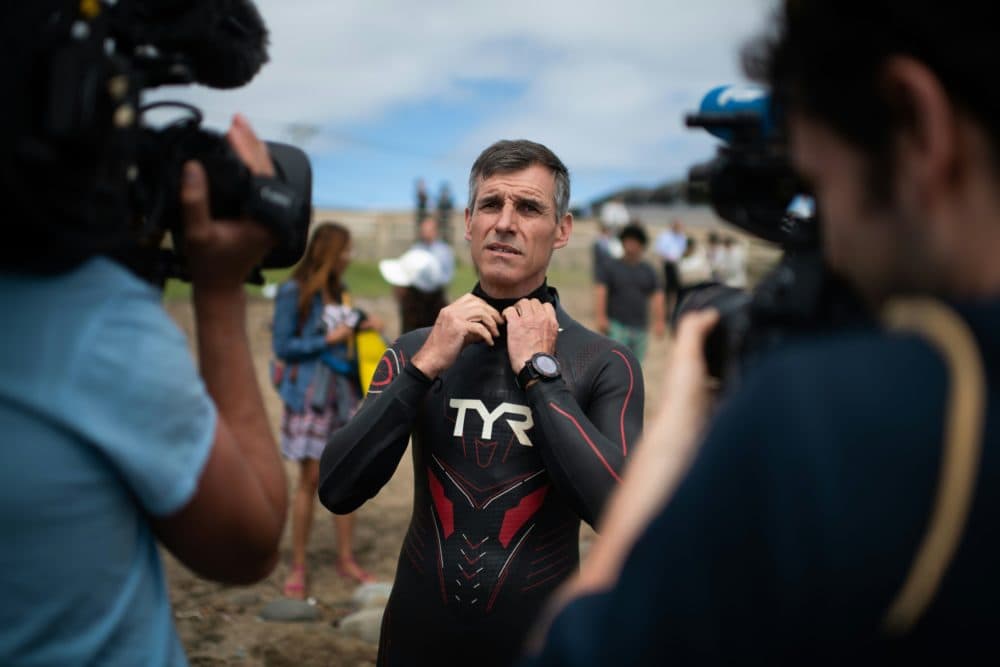Advertisement
After Abandoning Pacific Ocean Crossing, Swimmer Shifts Focus To Plastic Pollution
Resume
A long-distance swimmer recently gave up his quest to cross the Pacific Ocean, but he's continuing his mission with a new focus: documenting the extent of plastic pollution on Earth.
Here & Now's Jeremy Hobson checks in with Ben Lecomte (@BenLecomteSwim), who until recently had been swimming for 110 days in a row and is still at sea making his way back to the U.S. Seeker.com has been following Lecomte's journey across the Pacific.
"I swam around 1,700 miles, and unfortunately, our equipment gave up before I did, and we had to stop for safety reasons," Lecomte says.
Even though he stopped swimming, Lecomte says they never stopped their mission, which was collecting data on plastic in the ocean.
"From the first day up until now, we see plastic every day," he says. "So we see an average of one piece of plastic debris floating every three minutes, and when we collect microplastic, it's about the three pieces that we collect every minute, and it has been some areas were very dense, 600 microplastic pieces in 30 minutes."
Interview Highlights
On why Lecomte had to stop swimming
"We used a sailboat, and the mainsail had a rip because of the strong wind that we were experiencing. And also we have limited resources [such] as fuel, so if we don't have a mainsail, we can only rely on fuel. And then I couldn't keep on swimming because I was swimming every mile, and I was being called back to the point where I stopped first the last time I was in the water."
"I realized that the danger is not the shark, it's the plastic that we see every day that is there and that shouldn't be there."
Ben Lecomte
On his interactions with sea life along the way
"Yeah, that was amazing. I mean, to see how sea life is very curious, and how they come around, and they are with me just to check me out, and that was [an] amazing experience. So, you know, fish, like a mahi-mahi, even came close to me or a shark or a swordfish or whales, turtle, and you know, the sharks they for a little bit, they check on me twice and came very close. At no moment it expressed any aggression, so I felt comfortable staying in the water, and I realized that the danger is not the shark, it's the plastic that we see every day that is there and that shouldn't be there."
On the ocean conditions during his swim
"It depends. You had very huge swell. That's where, I don't know, [the waves were] over 120 feet high ... and you had very choppy water, and sometimes it's very difficult to swim in them because the waves were crushing on me and against me. ... Me being in the water, it's being a little cork, so I go all up and down."
On how to reduce plastic pollution in the ocean
"The first step I think is to get rid of single-use plastic. It's something that we do because it's very convenient, but we saw it in the water. We saw like plastic glass and plastic bottle, all of which we can live without it. So that would be a first step. And now it's to try to get people to understand that they inspire them to make some changes. That is very challenging."
On if he will ever try something like this again
"I'm working on the next expedition from Hawaii to California. That will be the same mission. It will still collect data about plastic, microplastic and so on because we want to have a cross section of the entire ocean to contribute to the collective knowledge about plastic pollution. So that is very important. And the last thing we want to do is to inspire people to change their habits. That won't change. We'll still be swimming."
Lynn Menegon produced and edited this interview for broadcast. Samantha Raphelson adapted it for the web.
This segment aired on December 7, 2018.
